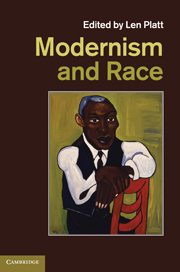Book contents
- Frontmatter
- Contents
- Notes on contributors
- Introduction
- 1 Germanism, the modern and ‘England’ – 1880–1930: a literary overview
- 2 ‘All these fellows are ourselves’: Ford Madox Ford, race and Europe
- 3 ‘’Tis optophone which ontophanes': race, the modern and Irish revivalism
- 4 Generating modernism and New Criticism from antisemitism: Laura Riding and Robert Graves read T. S. Eliot's early poetry
- 5 Race, modernism and the question of late style in Kipling's racial narratives
- 6 Atlantic modernism at the crossing: the migrant labours of Hurston, McKay and the diasporic text
- 7 Claude McKay in Britain: race, sexuality and poetry
- 8 Wyndham Lewis and the modernists: internationalism and race
- 9 ‘Until Hanandhunigan's extermination’: Joyce, China and racialised world histories
- 10 Race, gender and the Holocaust: traumatic modernity, traumatic modernism
- Index
- References
5 - Race, modernism and the question of late style in Kipling's racial narratives
Published online by Cambridge University Press: 03 May 2011
- Frontmatter
- Contents
- Notes on contributors
- Introduction
- 1 Germanism, the modern and ‘England’ – 1880–1930: a literary overview
- 2 ‘All these fellows are ourselves’: Ford Madox Ford, race and Europe
- 3 ‘’Tis optophone which ontophanes': race, the modern and Irish revivalism
- 4 Generating modernism and New Criticism from antisemitism: Laura Riding and Robert Graves read T. S. Eliot's early poetry
- 5 Race, modernism and the question of late style in Kipling's racial narratives
- 6 Atlantic modernism at the crossing: the migrant labours of Hurston, McKay and the diasporic text
- 7 Claude McKay in Britain: race, sexuality and poetry
- 8 Wyndham Lewis and the modernists: internationalism and race
- 9 ‘Until Hanandhunigan's extermination’: Joyce, China and racialised world histories
- 10 Race, gender and the Holocaust: traumatic modernity, traumatic modernism
- Index
- References
Summary
‘Kipling's last stories were no less tormented and mazelike than the stories of Kafka or Henry James, which they doubtless surpass.’ The verdict is that of Jorge Luís Borges in the Preface to El informe de Brodie (1970), a collection of his own latter-day tales. The comparison is at once striking and puzzling. While it is not wholly unusual to mention Kipling in the same breath as James, he has seldom been read as Kafka's contemporary, let alone as a possible precursor. Yet the phrasing of Borges's judgment is perfunctory, almost half-hearted, as though Kipling's superiority over Kafka or James in angst or intricacy were somewhat dubious or, at least, not beyond discussion. And so it proves: Borges's preference is for the youthful Kipling circa 1886–7, the author of Plain Tales from the Hills; for it is the ‘straightforward manner’ of this Kipling that Borges announces that he wishes to emulate. An older, wiser man ‘who knows his craft’ has deliberately set out to repudiate his erstwhile persona and to take on instead the burden of ‘a young man of genius’.
One effect of Borges's ironic declaration of intent is to situate the later Kipling firmly, if not entirely advantageously, within the domain of early modernism: better than Kafka, but worse than the Anglo-Indian stories on which Kipling's initial reputation rested. The allusion to Kafka is provocative and oddly suggestive, implying a new and more heterodox approach to Kipling's achievement.
- Type
- Chapter
- Information
- Modernism and Race , pp. 97 - 115Publisher: Cambridge University PressPrint publication year: 2011



